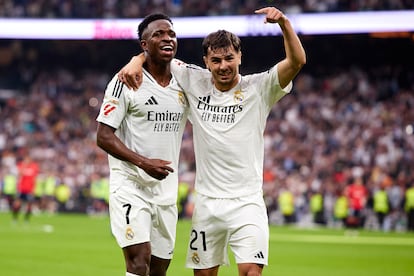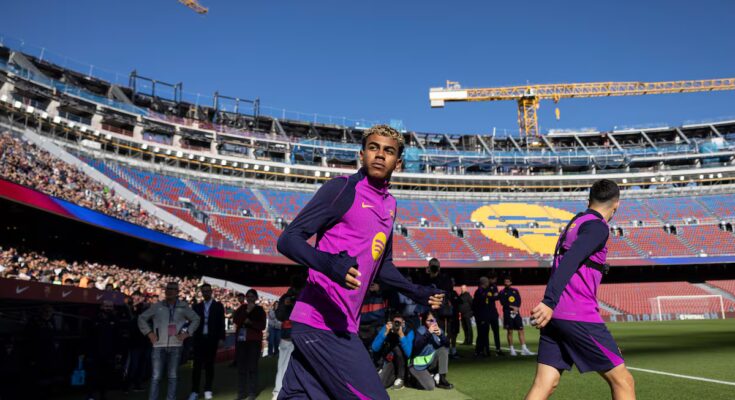“Fucking moron.” “Mineral”. These are some of the attacks spewed on social networks last September 22nd. That night, an 18-year-old Spanish boy was competing to win the Ballon d’Or. Lamine Yamal was in Paris, dressed in Dolce&Gabbana, accompanied by his entire family, happy, ambitious. The award went to the other favorite, Ousmane Dembélé. But the boy once again won the Kopa Trophy for the best footballer under 21 years old. And it generated as many conversations as the French one. Forever. And worse. Because in his case, the humble origins of his family and the countries of origin of his parents – she is from Equatorial Guinea, he from Morocco – weigh on how he is perceived and treated by some of his compatriots. Or, at least, those that manifest themselves on social networks. His goals, his celebrations or his sensational publications, together with his undeniable success as one of the best footballers of the moment, arouse the hatred of those who consider him different because of his origins and the color of his skin. And he’s not the only one. The same thing happens to Real Madrid player Vinicius Jr. or Athletic players Iñaki and Nico Williams, who have denounced on several occasions the racist attacks they receive in Spain.
It is not a whim, nor an opinion, nor a perception. It’s a test. Not only for the shouting that is often heard in stadiums, as reported by several complaints that ended up in the courts and with the expulsion of some fans from the stadiums. This is evidence collected thanks to the work of the Spanish Observatory on Racism and Xenophobia (Oberaxe), which has been working for years to prevent hate speech in sports. This Observatory is fundamental in the agreement signed between the Ministry of Inclusion, Social Security and Migration and LaLiga, from which a first devastating report emerged. Thanks to the so-called FARO system, which applies artificial intelligence to the Oberaxe methodology, we know that in the last season of the football competition in Spain, 33,438 reportable contents were detected, of which the different platforms managed to remove 33% of the total. Facebook is one of those that reacted the most and best, removing 62% of the reported contents; X only did so with 10%.
This is explained by a report to which EL PAÍS had access and which highlights that the monitored hate speech is mainly aimed at footballers, highlighting in particular Lamine Yamal (target of 60% of the attacks and insults) and Vinicius (with 29%), who receive a significant percentage of the insults. To a lesser extent, other players such as Mbappé, Balde, Brahim Díaz or Iñaki Williams are also objects of hatred, due to their biological characteristics and the stereotypes associated with them. “This fact demonstrates how the sports field can reflect and reproduce dynamics of discrimination, also linked to religion and the social construction of cultural identities,” the document indicates. “When the political struggle and the parties make immigration one of their main themes, the political discourse ends up penetrating other scenarios, such as football,” claims Javier Gomá, Spanish philosopher, writer and essayist, director of the Juan March Foundation.
Analyzing hate speech against the football team, we observe that Real Madrid (34%) and FC Barcelona (32%) together concentrate more than 65% of the negative messages directed at the players. Followed by teams such as Real Valladolid (17%), Valencia (8%), Athletic Club (6%), Real Sociedad (5%) and Atlético de Madrid. “This distribution reflects not only the popularity and visibility of these clubs, but also the way in which sporting rivalry can be intertwined with discriminatory expressions,” explains the Oberaxe research team in this report.

In fact, as the data collected during the last season warns, the evolution of hate speech in football “shows significant peaks on dates linked to sporting events of high competitive relevance, in particular, on 27 and 28 October 2024, 3,675 and 2,855 messages were recorded respectively, coinciding with the first classic of the season between Real Madrid and FC Barcelona”. This highly visible event, the document continues, “amplified expressions of hatred, mainly aimed at the footballers Lamine Yamal, Raphinha and Ansu Fati, who were the subject of racist and xenophobic attacks. Likewise, there was high hostility towards Vinicius Jr. during the match and after his public denunciation of the racist acts that occurred there”. Among the examples detected are derogatory nicknames such as “Monicius”, in reference to Real Madrid’s Brazilian striker, and discriminatory comments towards Lamine Yamal. For example, this comment: “No matter how much he plays for Spain, he will remain a ‘Moro’ for life.” Because, as Gomá points out, the fact that Yamal is Spanish ends up being a reality that many expressly overlook. Those who insult him do not admit him as one of them because “the manifestations of hatred do not like clarifications or the truth; they seek the applause of the group in that public liberation”.

The report also highlights how the networks reacted to the public expression of some footballers in relation to the celebration of Ramadan. “This phenomenon has caused considerable polarization on social networks, where xenophobic and racist discourse has emerged, including insults that dehumanize players with terms such as ‘pig,’ accusations of being ‘unpatriotic’ and direct attacks on Muslims, such as ‘all the Moors with your religion leave here.’”
“There have been territories where we have left a certain impunity, and it is important to do self-criticism. Perhaps at times we have been lukewarm with some messages we have heard. There should never be room for an insult, much less an insult that dehumanizes; not even in sport”, reflected the Minister of Inclusion, Social Security and Migration, Elma Saiz, a few weeks ago during her speech at the World Football Summit held in Madrid.
We know what Vinicius thinks of the racist expressions he perceives in Spain, as he publicly denounced them in an impressive press conference after the unpleasant episode he experienced at the Mestalla in 2023, when a couple of fans shouted “monkey” at him from the stands. “A beautiful nation, which welcomed me and which I love, but which agreed to export the image of a racist country to the world. I am sorry for the Spaniards who do not agree, but today, in Brazil, Spain is known as a country of racists”, he then said. Lamine Yamal, on the other hand, didn’t make many references, although he was clear in an interview with José Ramón de la Morena: “Have you ever seen a black person call someone white on the street? No, because we have half a brain,” replied the Barça player.
His entourage acknowledges, in a conversation with EL PAÍS, that the racist comments do not worry the boy. Arguably, hate speech is so normalized that, they explain, it even makes jokes about itself. He also knows how to concentrate on what is important, what to see and read and what not to pay attention to, even if in general it bothers him to hear himself in all sorts of ways: “He gets tired of seeing himself everywhere, this stresses him out, but not racism, he never victimises himself; on the contrary, he replies: ‘I speak on the pitch’, says those close to him. His family, on the other hand, suffers more. Like that Champions League night in Mono Burgos, then a commentator from Movistar + said that “if not it goes well (in football), it ends at the traffic lights.” The father burst into tears and ended up calling Joan Laporta, president of Barcelona, to ask for an official reaction from the club; That same night the mother asked for a statement from the player’s press office. However, the next day, the footballer apologized to Mono Burgos: “He wanted to flatter me, even if he couldn’t find the words,” he told them.
According to monitoring data, North Africans and Muslims are the main recipients of these messages, accounting for 42.38% and 41.18% of hate speech, respectively. Followed by Africans and Afro-descendants (14.57%) and unaccompanied foreign minors (10.50%), who highlight a marked ethnic-racial dimension in the discourse.

“Puto negro” and the peak of insults around the classic
As the report aptly explains, all of these expressions “reflect persistent prejudice and stigmatization based on their ethnic and cultural origin, which transcends the sporting field.” The way in which you insult is also significant for understanding hate speech: 97% of messages use aggressive and explicit language, based mainly on direct insults and disqualifications. Among the most frequent expressions are “shit” (21.81%), “whore” (15.69%) and “black” (8.37%). The expressions detected aimed at players reproduce stereotypes, as in phrases such as: “You fucking nigger, die” or “Dirty Moro”. This content, Oberaxe points out, “does not only affect players individually, but also projects prejudices onto different target groups such as North Africans, Muslims, Africans or foreign minors”.
For example, some of the monitored contents: “Nico and Vinicius are monkeys and Lamine is a brunette”, “The black shit of Iñaki Williams” or “los conguitos de España”. Likewise, in 22% of cases, the messages indicate that the players in question represent a threat to citizens, legitimizing their exclusion. Examples such as “he’s a shitty brunette” or “they should break his legs”, expressly addressed to Lamine Yamal in that classic from October last year, immediately after scoring in the 77th minute of the match; even a “they should expel him from Spain as he arrived, on a boat”, which they dedicated to the young footballer after assisting Raphinha in the goal in the 84th minute which ended up dooming the match in favor of the Blaugrana (0-4), reflect how the content not only insults, but incites hatred, violence and expulsion. Javier Gomá claims that “minorities have never been so protected and the fact of feeling refusal in the face of these insults is a moral progress of our time”.
All these data, the report concludes, “demonstrate the need to promote a culture based on the principle of non-discrimination, through respect and coexistence, on and off the pitch”. LaLiga and the Ministry got to work. But there is still a lot of work to do to ban hate speech from football.



